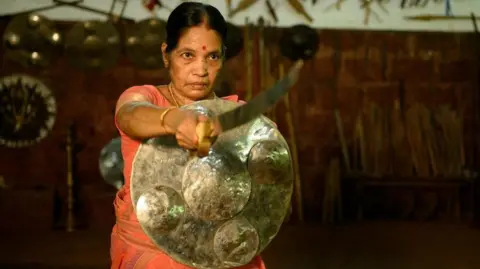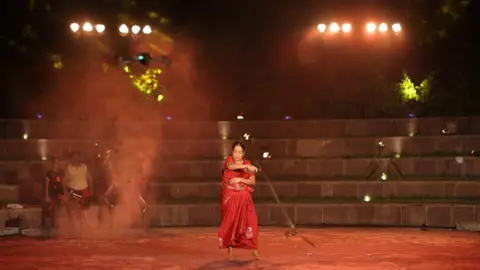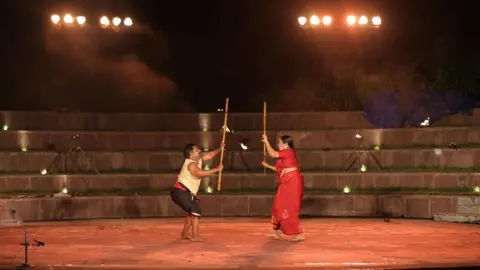India's sword-wielding grandmother still going strong at 82
 Meenakshi Raghavan
Meenakshi RaghavanAn 82-year-old woman who teaches the ancient Indian martial art of Kalaripayattu says she has no plans to retire.
"I'll probably practise Kalari until the day I die," says Meenakshi Raghavan, widely thought to be the oldest woman in the world to practise the art form.
Kalaripayattu - kalari means battleground and payattu means fight - is believed to have originated at least 3,000 years back in the southern state of Kerala and is regarded as India's oldest martial art.
It is not solely practised for combat or fighting; it also serves to instil discipline, build strength and develop self-defence skills.
Ms Raghavan is fondly known as Meenakshi Amma - Amma means mother in the Malayalam language - in Kerala's Vadakara, where she lives. The town is also home to other renowned exponents of the art like Unniyarcha, Aromal Chekavar and Thacholi Othenan.
Meenakshi Amma occasionally performs in other cities but mainly runs her own Kalari school, founded by her husband in 1950. Her days are busy, with classes from five in the morning to noon.
"I teach about 50 students daily. My four children were also trained [in the art form] by me and my husband. They started learning from the age of six," she says.
 Meenakshi Raghavan
Meenakshi RaghavanKalaripayattu has four stages and it requires patience to learn the art form.
Training begins with meypattu - an oil massage followed by exercises to condition the body.
After about two years, students progress to kolthari (stick fighting), then to angathari (weapon combat), and finally to verumkai - the highest level, involving unarmed combat. It typically takes up to five years to master Kalaripayattu.
Kung fu is believed to have adapted principles like breathing techniques and marmashastra (stimulating vital points to optimise energy flow) from Kalaripayattu, according to Vinod Kadangal, another Kalari teacher.
Legend has it that around the 6th Century, Indian Buddhist monk Bodhidharma introduced these techniques to the Shaolin monks, influencing the more famous Chinese martial art.
Meenakshi Amma still recalls the first time she stepped into a Kalari - the red-earth arena where the art is practised - 75 years ago.
"I was seven and quite good at dancing. So my guru - VP Raghavan - approached my father and suggested that I learn Kalaripayattu. Just like dance, the art form requires you to be flexible," she says.
Hailing from Kerala's Thiyya community, Meenakshi Amma's guru was 15 when he and his brothers opened their own Kalaripayattu school after being denied admission elsewhere because of their low social caste.
 Meenakshi Raghavan
Meenakshi Raghavan"There was no bias when it came to girls enrolling to study Kalari - in fact, physical education was compulsory in all Kerala schools at that time. But we were expected to stop after attaining puberty," she says.
Unlike others, Meenakshi Amma's father encouraged her training into her late teens. At 17, she fell in love with Raghavan, and they soon married. Together, they went on to train hundreds of students, often for free.
"At the time, a lot of children came from poor families. The only money he [Raghavan] accepted was in the form of dakshina or a tribute paid to the teacher," she says.
Donations sustained the school, while Raghavan later took a teaching job for extra income. After his death in 2007, Meenakshi Amma formally took charge.
While she has no plans to retire at the moment, she hopes to hand over the school one day to her eldest son Sanjeev.
The 62-year-old, who is also an instructor at the school, says he is lucky to have learnt from the best - his mother. But being her son earns no favours; he says she's still his toughest opponent.
Meenakshi Amma is a local celebrity. During our interview, three politicians drop by to invite her to an awards ceremony.
"Amma, you must grace us with your presence," one of them says with folded hands.
"Thank you for considering me, I'll attend," she replies.
Her students speak of "fierce admiration" for her. Many have opened their own Kalari schools across the state, a source of great pride for Meenakshi Amma.
"She's an inspiration to women everywhere - a rare person who shows love and affection to her students, yet remains a strict disciplinarian when it comes to Kalari," says KF Thomas, a former student.
Follow BBC News India on Instagram, YouTube, X and Facebook.
